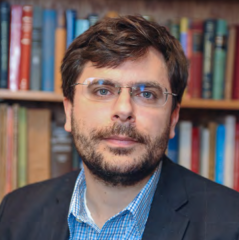Upcoming Event: Seminar
Steve Pressé, Arizona State University
3:30 – 5PM
Friday Sep 12, 2025
POB 4.304
In the Natural Sciences we are often confronted with complex data and little prior intuition about the correct underlying model to be parametrized from this data. In this talk, I will highlight how Bayesian nonparametric methods—in particular Beta-Bernoulli process and related stochastic process priors—can be leveraged for tracking applications. This framework allows us for the first time to perform reliable tracking in crowded environments where classical approaches break down. I will also discuss the limits of parametric modeling. Motion models beyond ordinary diffusion—commonly reported in the single-molecule literature—prove extremely difficult to distinguish from experimental noise when inferred from optical data. Our analysis raises serious doubts about many claims of anomalous diffusion and other parametric models recovered from biophysical contexts. In the same spirit I will present failure modes of hidden Markov models when applied to physical systems showing how their restrictive assumptions can lead to misleading conclusions. Together these examples underscore both the power of the Bayesian nonparametric paradigm and the risks of relying too heavily on parametric simplifications in data-rich physical sciences.
Steve Pressé was born in Montreal and went to McGill University as an undergrad where he studied chemistry. He later pursued his doctorate in chemical physics at Massachusetts Institute of Technology (MIT) under the direction of Professor Robert J. Silbey. As a postdoctoral fellow in Professor Ken A. Dill’s lab, his research focus shifted to biophysics and dynamical processes in particular. He is now a professor at Arizona State University with dual appointment in both the physics and chemistry departments. His lab now uses both theory and experiments to address fundamental questions relevant to molecular science.
